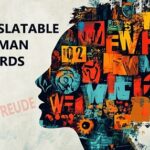In Part 3, we delve deeper into German idioms that offer insights into the nation’s mindset and values. Expressions such as “Den Nagel auf den Kopf treffen” and “Sich zum Affen machen” not only enrich your vocabulary but also provide a window into German culture. Let’s explore these sayings and their everyday applications.
Wo sich Fuchs und Hase gute Nacht sagen
Literally: Where fox and hare say goodnight to one another
English equivalent: In the middle of nowhere

Um den heißen Brei herumreden
Literally: to talk around the hot porridge
English equivalent: to beat around the bush

Da steppt der Bär
Literally: The bear dances there
English equivalent: To have a good party, to have a blast

Sich zum Affen machen
Literally: to make an ape of yourself
English equivalent: to make a fool of yourself

Den Nagel auf den Kopf treffen
Literally: to hit the nail on the head
English equivalent: to do exactly the right thing

Da kannst du Gift drauf nehmen
Literally: You can take poison on that.
English equivalent: You can bet your life on that.

Die Kirche im Dorf lassen
Literally: to leave the church in the village
English equivalent: to not get carried away

Related Articles:
German Idioms – Part 1: Everyday Sayings Explained
German Idioms – Part 2: More Quirky Expressions
German Idioms – Part 4: Final Collection of Expressions
12 Food-Related German Idioms
Untranslatable German Words You Need to Know
German Proverbs and Their Meanings
Bizarre German Idioms and What They Mean







